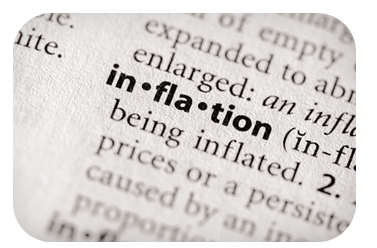 Seeing a smaller figure than you expected in your current account is never fun: a night out here; an extra bit of shopping there; and your account can soon start looking a little bare. Because it is so easy to spend your pennies with a swipe of a debit card, one of the first steps to establishing a savings habit is moving some of your pennies out from your everyday account into a dedicated savings account each time you get paid.
Seeing a smaller figure than you expected in your current account is never fun: a night out here; an extra bit of shopping there; and your account can soon start looking a little bare. Because it is so easy to spend your pennies with a swipe of a debit card, one of the first steps to establishing a savings habit is moving some of your pennies out from your everyday account into a dedicated savings account each time you get paid.
However, once in the savings account, your pennies are still not safe from the spectre of inflation: the gradual decrease over time of a currency’s purchasing power. With the current high levels of inflation in many countries around the world, your pennies are worth less every day, and low interest rates are preventing us from earning much in a savings account. At times like these, most of us are actually losing money in terms of what our pennies can buy when we come to spend them.
I actually have a friend who semi-joked (or at least I hope he was joking!):
“Adam, why bother saving if I’m actually losing money when I do? I may as well spend it and enjoy it”
Losing money is never fun but here are 6 reasons why you should keep saving. Yes, even if that means that are you slowly losing money in the short to medium term.
Emergencies

Nobody knows when an emergency might come: most us of know someone who has lost their job recently or had a pay cut. Perhaps your boiler will break unexpectedly, or your car might need major servicing. In any case, it’s great having enough pennies stashed away to make it through an unexpected event – it turns any ‘emergency’ into a temporary (but still annoying) inconvenience rather than a disaster.
Opportunities
 Having money in a savings account, even if it is slowly losing ‘real’ value, can give you a sense of empowerment: not only does it give you reassurance that you could cope with an ‘emergency’ but you can have confidence to say yes to other opportunities that may come your way.
Having money in a savings account, even if it is slowly losing ‘real’ value, can give you a sense of empowerment: not only does it give you reassurance that you could cope with an ‘emergency’ but you can have confidence to say yes to other opportunities that may come your way.
For example, what if your friends invite you to join them on a holiday or go travelling? Go ahead. You won’t regret it and it will feel great saying “yes” knowing that it won’t affect your everyday finances. Even modest savings allowed a friend of mine to quit a boring job to dedicate a few months to a search for something more fulfilling. Often the best opportunities require solid finances, and you are not going to be able to take advantage of them if you have been spending your money as you earn it (either through a desire to consume or for fear that inflation will take its value away from you). There’s more to the ‘value’ of money than just the figure in your account.
Confidence (to invest)
 A favourite reason of mine to save money: Having savings in cash for ‘Emergencies’ (#1), and ‘Opportunities’ (#2), even if the account is not earning any interest (and even if it is in fact losing value due to inflation), is a real confidence booster. You can begin to feel financially secure enough to invest extra pennies in other asset classes (different types of places to put your pennies), like the stock market.
A favourite reason of mine to save money: Having savings in cash for ‘Emergencies’ (#1), and ‘Opportunities’ (#2), even if the account is not earning any interest (and even if it is in fact losing value due to inflation), is a real confidence booster. You can begin to feel financially secure enough to invest extra pennies in other asset classes (different types of places to put your pennies), like the stock market.
More ‘risky’ investments may go up and down in the short term but because of your savings for #1 and #2, it doesn’t matter day to day. Investing is a long term thing and over time the value tends to go up considerably: the real protection against inflation (more on this subject @Magical Penny in the coming weeks).
Better mortgage rates
 Many of my friends are saving for a house. You may be too. One of the most important things is knowing if you are financially ready to buy a house. One great indicator is the size of your down-payment.
Many of my friends are saving for a house. You may be too. One of the most important things is knowing if you are financially ready to buy a house. One great indicator is the size of your down-payment.
Don’t rush to take advantage of low interest rates (which are generally seen as ‘bad’ for savings but good when you are borrowing money) if your down-payment is too small or you think that you are ‘wasting money’ by renting. Being patient and saving up an even bigger down payment than suggested by a mortgage advisor for property in your price range will save you thousands over the mortgage period (and helps avoid getting trapped in a house in the event of negative equity).
Ride the interest rate rise
Even if your pennies are earning nothing now, when interest rates do rise again in the future, your regular contributions will benefit from the rising tide. The more pennies in the account, the bigger the increase.
It would depreciate more when you spend it!
“Adam, why bother? […] I may as well spend it and enjoy it”
The biggest flaw in the argument about spending now: the stuff that most people buy loses value quicker than inflation. Is it really worth it? Is the item or experience going to give you lasting, (or medium-term!) joy? If you can truly answer yes, then go for it: Magical Penny is not about depriving yourself or hoarding your pennies. It’s about telling them where to go and making them work their own special kind of magic for your benefit.
Ultimately saving is a good idea so don’t let the recently published inflation figure in the UK, or around the world, change that. Hopefully next time you look at your bank statement you won’t see falling or stagnant numbers and the spectre of inflation hovering over-head: instead you’ll see numbers that represent security, opportunity and confidence. Act on these points by beginning to save something every month and you can ignore the doom and gloom news reports and walk around with a smile on your face, knowing you’ve got things covered.
Liked the post? You might like:
Why do 20 somethings hate learning about personal finance? @Studenomics
From my perspective I think it’s because we haven’t really thought about how skipping out on some things in your life now can get you a paid-for Ferrari just in time for your mid-life crisis!
If you’ve not already, sign up for my free newsletter for extra info not yet available on the blog.
 This post was featured the Personal Finance Carnival #243 hosted by JD Roth’s Get Rich Slowly, one of the biggest blogs in the PF blogosphere.
This post was featured the Personal Finance Carnival #243 hosted by JD Roth’s Get Rich Slowly, one of the biggest blogs in the PF blogosphere.
“Adam at Magical Penny has a thought-provoking look at why it’s okay to lose money in a savings account. He argues that even while inflation is chipping away at the value of your cash, there are great reasons to build your savings. I think his advice is right on.”
http://carnivalofpersonalfinance.com/

{ 5 comments… read them below or add one }
Nice well put article. With the pressure of buying a house to get the tax credit in the states here, I know that without a sufficient down payment I will just be hurting myself. I rent, and I like it. I have complete control over my greatest monthly expense. The right time to buy will come along eventually. Keep up the good work.
Thanks Professor for stopping by. I’m looking forward to the right time to buy too as getting on the housing ladder certainly has its advantages: but it’s not the best thing to do for most of my readers (people in their 20s who are just starting out).
I’ll be checking out your blog in more detail too -looks interesting.
It’s a little discouraging with low interest rates, but I still love seeing the money in my savings accounts rise. After reading so much about pf, I don’t look at my money the same. It’s just so much easier to save now with no dependents so that keeps me going.
How’s the blog going so far?
Austin @ Foreigner’s Finances
Agreed Austin. it’s great that you’re taking advantage of your age and lack of dependents. Thanks for coming over to the blog. It’s only been a week but I’m really excited on how it’s all going. Onwards and upwards. 🙂
Hey Adam, only just started reading this properly so I might make a few out-dated comments. I’m sure a few will play devil’s advovacate, but you’re doing well so far. I was lucky enough to have a savings account from a very young age. It has run very much along the lines you have mentioned throughout your blog, growing with certain opportunities and shrinking as I have pursued opportuities and purchases of my own.
There is a lot of value in sliding away that £50 of Christmas money that you don’t ‘really’ need to spend right now. Also, when clearing my student overdraft (over £1k), by syphoning off large amounts of my wage while living at home (basically paying board and living off a small amount a week, but perhaps adding to the overdraft very slightly) I kept costs down artificially below what they would have been tempted to be otherwise. As soon as I hit just below the interest free limit, the funds were transferred over as needed, with a little to spare.
Then I moved out and wished I’d saved more.
Anyway, I digress. Good start .
You must log in to post a comment.
{ 1 trackback }